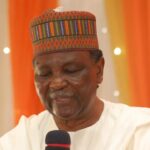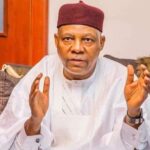Alhaji Awwal Ibrahim, the Emir of Suleja, was born on September 8, 1941, about 77 years ago. He said he got to know his birthday because his father was one of the sanitary inspectors who kept records of births and deaths. Among other issues, the traditional ruler shared his experiences as a student, the first civilian governor of Niger State, lecturer and university administrator.
At 77, you are the traditional ruler of Suleja, how did the journey of life start?
I attended my first formal school in Bida in 1949 while I was under the care of my uncle and father-in-law who adopted me. He was a teacher at Bida Middle School before he became an inspector of education. So he enrolled me in the school. He was a role model to me.
We took our education seriously. I remember that during our early schooldays we walked a distance of about three kilometers or even more to go to school. But in spite of that, we never got to school late, let alone miss it, no matter what was the circumstance. After about a year in Bida, I came back to my hometown, Suleja, to continue my primary school and later, middle school, before I went back to Bida for secondary education. I left in 1961 and went to Kano to attend the then Ahmadu Bello College, which was changed to Abdullahi Bayero College. When the name, Ahmadu Bello College was adopted for the first university in the northern Nigeria region, the present Ahmadu Bello University (ABU), Zaria, we continued there. The school became a faculty under the ABU, such that after obtaining our A- levels we started our degree courses in the same Abdullahi Bayero College campus. So I took a degree in ABU in 1967. From there I went abroad for my master’s, as well as post-graduate diploma in Linguistics. I took a degree in combined honours in languages – English, Arabic and French – but I did my master’s in Applied English Linguistics.
I was appointed as an assistant lecturer soon after my degree at Abdullahi Bayero College under the ABU then, and presently BUK, before going out to further my education as I mentioned earlier. I later came back to continue as a lecturer.
I moved to administration when Professor Mahmud became the vice chancellor of the university. From there, a request was made by the then newly established Niger State government, which was carved out from the old Northwest State Government, with capital in Sokoto, to serve as a permanent secretary. So I was seconded to the Niger State Government. I first served in the special duties office, where my first call of duty was to organise a very successful local government election.
Then I was moved to the Ministry of Education, the largest ministry in the government, also as a permanent secretary. And there, again we did the best we could under very difficult circumstances. While I was serving in that ministry as permanent secretary and still handling the issue of resettlement of the new Federal Capital Territory (FCT), I was called upon to join politics and eventually contest in the governorship election under the National Party of Nigeria (NPN). We won the election.
How would you describe your upbringing?
Alhamdulillahi, we had a proper upbringing. We were brought up to be disciplined and concerned about other people’s interests and do the best we could in respecting and helping the community. It was that kind of background that our mind was shaped.
I had the fortune of attending early Quranic school. I was fairly well grounded in Islamic education. I also had the fortune of getting a very good primary and secondary education. And when we crossed over to the university, we exhibited a sense of patriotism, which helped us tremendously to ensure that the education we had at that level was something to reckon with. We were patriotic and concerned about the progress of our country. After graduating, we tried to serve our community and nation in general, to the best of our abilities.
Did you face any specific difficulty while growing up?
Well, if I look at what is happening these days I would not complain about the hard life we faced during my youthful days. Our parents were very humble. They believed in dedicating themselves to earn a living through legitimate means. So we had very little of what was coming from the family, in terms of resources that would support our lives. We also participated in such activities that would earn us our own personal income and enable us contribute towards the general welfare of the family.
In those days, education was, far and large, free. I remember that parents had to contribute very minimally; not in cash really, but in terms of food. In the middle school it was virtually free, so to say. The government then was keen on keeping us going in a very modest way. Imagine a situation when in secondary school you were given pocket money as students. No matter how small it was, it gave you encouragement. We had tremendous desire for good education, and the government supported us to succeed.
How was life at the Provincial Secondary School, Bida?
My secondary school life was really shaped by the colonial policy. I must say that we were highly disciplined and very patriotic. We knew what the country needed to get right and we were always eager to excel; hence we ensured that we didn’t waist our time. We were able to perform well and ensure that we contributed towards the manpower development of the country. So my secondary school life was very fulfilling. We had very good and committed teachers and we worked hard.
Our set did not have the opportunity of going into the military as that policy came a year after us. However, some of our classmates went into the military. I was to go into the police but I turned it down and went for post-secondary education. We were well disciplined and provided with all our needs, in terms of welfare. I remember that we even had weekly allowances. However, we were just small in number. In our class, when we started we were about 60; for the first time, we were running a double stream: A and B. But by the time I got to the final year of the West African Examination class, we were just a single class. The other stream had to find their way to other institutions – training colleges, technical colleges and that kind of thing. We finished and took our West African Examination Council as a single class of about 30 in number. But nowadays we have so many streams in classes, from class A up to D and above, given the kind of upsurge in our population. What we are seeing these days is really frightening. There is the need to heavily invest in education for us to ensure that the kids we have in schools today are fairly well cared for, as well as planning on how to utilise the kind of manpower resources we have.
What was your most memorable moment in secondary school?
While we were in our final year, one thing I can hardly forget is how we tried to reduce the influence of colonial teachers on us. We just wanted them to serve us as teachers, not dictating how we should go about associating ourselves with the development/yearning of the country. Let me explain. We were beginning to imbibe the culture of serving our country the way our political leaders of those days believed it should be developed. I remember a time when, as students, we took a decision to lock out some of our teachers (colonial teachers) away from our class as a way of protest because we were not happy with the way they were administering us. They had to report us to the Etsu Nupe, who came down to our school, pleaded with us and restored normalcy. We opened the door for Etsu Nupe on arrival and he sat with us and we related to him our grievances, which included the need for inclusion of local teachers in the schools’ administration. He gave us assurances that he would ensure some changes in the matter. That was how the issue was resolved. It was one incident I will never forget. This is the kind of student politics we played in those days, out of patriotism for our dear country. We were civil and never violent in any way. Now, you can contrast that to what is happening in some of our school campuses.
Thereafter, I went to Abdullahi Bayero College, then Ahmadu Bello College in Kano, which was attached to my GCA level courses; from there we went to the university. It was during our time that our college became Ahmadu Bello University.
You were a lecturer and later a university administrator; can you share your experiences?
I must say that my life in the academic circle was a very pleasant one but also challenging. We wanted to excel academically and bring up students who would carry the mantle of leadership in the development of this country. When I found myself seconded to government service, it was entirely a different kettle of fish. The life of an administrator is far more challenging because you have to tackle a lot of problems. There are various interests, and so on. My transition from academic, that is from class to administration, was itself very interesting to me, in the sense that we had the opportunity to meet leaders who were really very experienced with vision and dedication to their services. And we tried to learn from them to see what contribution we could make. So it was not a very difficult transition for me, even though state administration was far more challenging.
What is the difference between being a governor at the time you emerged and now?
At the end of my tenure as governor of this state there was a coup d’état and we were thrown into jail. But without blowing my own trumpet, we did our best as first civilian politicians in a post military era. We were operating a new system of government, which was entirely new to us. We had a lot of problems trying to establish a relationship between us and the legislature. But fortunately for me in Niger State, we had party discipline and a body we called a caucus, which had tremendous impact on how to go about governance. That caucus was made up of party stakeholders in the executive, as well as the legislature. We never took any decision on how to go about executing programmes and so on without meeting these three bodies; namely, the party, the executive and the legislature to decide on how best to go about serving our party supporters and people generally. That contributed tremendously in making things easier for us. These days, I don’t think we have that kind of understanding.
Tell us about your experience as governor of Niger State?
My experience as the first civilian governor of Niger State in the late 1970s and early 1980s was very challenging. It was challenging in the sense that the system was entirely alien and not known to us; that is the presidential system of government. You had to interact with three tiers of government – the Executive, Legislature and Judiciary, which were quite independent. We tried our best to ensure that we played the game by the rules as we understood them. Of course we enjoyed massive support from our people, both in the executive branch, where I belonged, and the legislature. We were fortunate to have competent, dedicated and experienced civil servants who worked under military governments.
My experience as an administrator and permanent secretary helped me tremendously to face challenges as civilian governor. I enjoyed the support of civil servants who dedicated themselves to their service. I never saw any reason to consider them as stumbling block to my work as governor. We worked as friends and colleagues.
The political system was really about people’s movement. We enjoyed the goodwill and support of the party in ensuring that we had a better understanding of politics and our expectations as government. Of course we faced difficult circumstances, but because of the goodwill and our determination to make a success of our situation, we excelled. Never mind the deliberate campaign by the opposition who had to use the media some time as the watchdog of the people to keep us on our toes. That also helped us to perform.
Were allocations from the Federation Account enough for salaries and projects?
Well, we managed to improve our internal revenue base. If you compare the federal allocations that come to the state governments nowadays to what obtained in those days, you would see that ours was nothing to write home about. For example, we used to get not more than N11million from the Federation Account monthly, but we managed to provide essential services to the people. One thing I’m proud of is that during my service as the governor of the state we ensured that all the civil servants were adequately compensated, by way of getting their salaries, allowances and so on. We also managed to pay our contractors. We were able to effectively manage the little money that came to us.
Were you entitled to what is referred to as security votes today?
We had security votes, but we still had the discipline to work within our budget. I remember very clearly that my security vote was not more than N1million per annum. And for the four years I served, I think I had just a little over N4million as my security votes. But don’t forget that when we were eventually pushed out of government by the military, we had to go through tribunals and so on to explain how we spent the money. I was fortunate to account for that as we tried to ensure that we worked under the approved budget of the state. Despite the fact that we faced tribunals, we really had nothing to hide because we had the appropriate accountability, so I never had any problem.
What was your memorable moment as governor?
After so many years, it is not easy for me to really say what my memorable moments were. But I recall how we managed or executed some of the projects that were started by the military to our satisfaction. For example, I remember how we managed to effect the construction of Artillery Road in the state capital, Minna to completion level; also, the bypasses road of the city. We also managed to improve on the development of education in the state. In the negative aspect, we faced a lot of challenges of having to cope with people’s demand, based purely on ethnic interests. But again, like I said earlier, because of the goodwill we enjoyed, we were able to handle the situation to the best of our ability. I can’t point precisely at what was the most memorable moment for me, but in all, we tried to do our best despite some difficult circumstances we had, especially in the area of resources at our disposals.
How do you relax, despite your tight schedule as emir?
Until very recently, I used to be a keen horseman, but with the advance in age, I reduced my participation to only those soft games like golf. However, it is equally challenging and rewarding, physically. But I make ensure I keep on with my routine study of books. I also visit friends that are very close to me, as well as my farm. But because of my health problem I have suspended some of these things. However, routinely, from 8 to 10 in the morning I try to do self education – learning more about my religion, reading a lot of books to see how the world is going on. There is very little time to watch television and things like that.




